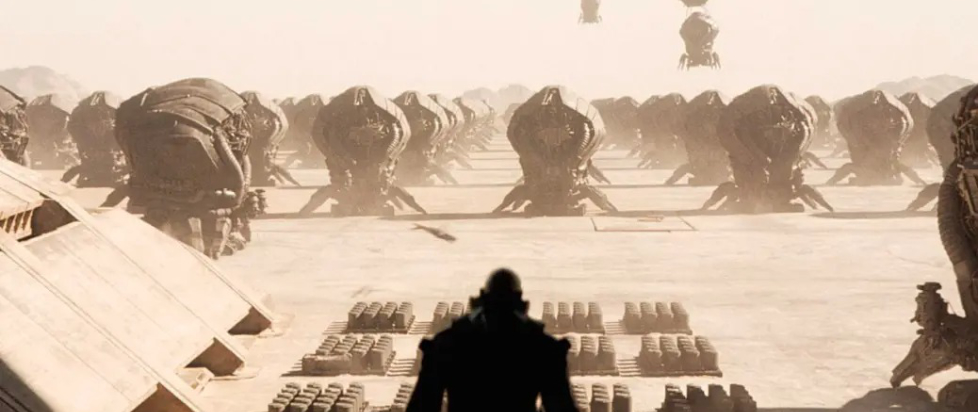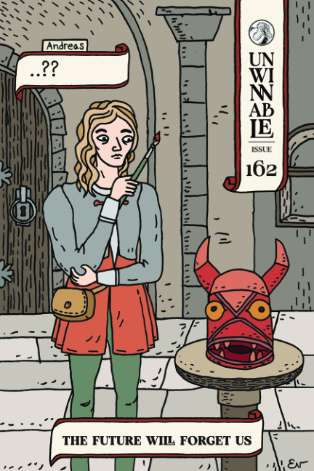
Honor Among Adaptations

This column is a reprint from Unwinnable Monthly #162. If you like what you see, grab the magazine for less than ten dollars, or subscribe and get all future magazines for half price.
———
Interfacing in the millennium.
———
I’ve been watching The Umbrella Academy. As a comics purist and a consummate hater, it’s not going great. I find myself inevitably distracted by my memory of the original text, waiting with bated breath for moments I think are being gestured towards that never come, griping at small choices in production design or costumes, rolling my eyes at the script. I find myself exasperated and exhausted – with the show, yes, but more often with myself, with my inability to sit back and be chill just because something is borrowing a couple character names from something else I loved.
My working theory is that there are two kinds of viewers (readers, players) of adaptations. The first kind, my kind, is bristly and ungenerous. We guard the things we love and bare our teeth at anyone that dare touch our children; we look for fights. The second kind are expansive, open-armed. They have something they love and want more of it; they look for the good, not the bad. I envy their simplicity, the pure power of their love, and I’m frustrated by them, by their lack of criticism, their blithe acceptance of what they’re given.
This contrast is made more pronounced by just how many ways an adaptation can be approached. There are no rules for process that determine quality. Many people’s first instinct – that the original is always better – is easily disproved by the usual suspects: the Godfather films are artistic masterpieces in a way Mario Puzo’s capable but workmanlike novel doesn’t manage, The Silence of the Lambs makes a tremendous project out of Thomas Harris’ barely functional Hannibal Lecter books. Would Andrzej Sapkowski, after writing his first Witcher book, have ever imagined that the most praised take on its characters would be a 50+ hour videogame? All of these adaptations came out of clear love for the source material, and of a desire to create a true tribute that arguably surpassed the original. The puzzle pieces are all there, just assembled in a way that somehow creates a clearer picture.

When I went to see the Dungeons & Dragons movie, I was stunned by how much it captured the spirit of the game, not as it is written but how it is played. The characters are pulled and pushed seamlessly through this world, past unexplained proper nouns and hand-waved backstory, all the grand tomes of lore and history nothing but set dressing for the real appeal of D&D, which is jury-rigging some weird shit in a fake world in order to win treasure and make NPCs like you. It felt like a good adaptation not because it was particularly faithful – how could it be, when the source material is that vast? – but because it distilled and presented some core essence of the work it came from, and made it recognizable, through another medium, to the same audience.
That is another way to adapt. Accuracy can easily be supplanted by feeling for an audience predisposed to be fond. But even as I write this, I’m conscious of how limiting that perspective is. What about adaptations that do not follow the same logic as their source material? What about taking a text created by someone else and changing something core to its nature, to the way it feels or the message it sends? We’ve seen this countless times with dark fairy tales, a seemingly infinite natural resource. What if, these creators dare to ask, something intended for children was actually made for adults? American McGee’s Alice, Brom’s The Child Thief, Tim Burton’s Willy Wonka . . . all twist the fundamental intentions of their source material, perhaps in content but especially in tone. Disney’s even capitalized on the premise, their young adult series of Twisted Tales only the latest addition to the ever-circling ouroboros of recycled stories.
Edgy children’s books aside, there is something genuinely interesting to the concept of adaptations that gut the earlier work, switching genre or changing primary characters or moving the setting to something unrecognizable. It’s a game I play often with friends: what would you like to see most, Wes Anderson’s Elric or Michael Moorcock’s Grand Budapest Hotel? The mismatch becomes the point; the inherent unsuitability of the theoretical artist for their theoretical material becomes interesting in itself. Free of the oppressive restriction of feeling, suddenly there’s so much room to play. You might not please purists – you might infuriate them, in fact – but that’s not the point. Why make art if you’re only going to do the expected? A faithful adaptation can be satisfying, but an unfaithful adaptation can be invigorating.
This is what I have to tell myself, as I run back to my comics in frustration. An adaptation – from book to film, from comics to TV – is serving the same function as a translation. There is always going to be something lost. In some cases, as with the notorious Icelandic translation of Dracula, so much is lost that the finished product takes on an identity of its own. That’s not a bad thing. As I watch The Umbrella Academy, it reminds me of what I love about the comics, as much for what it contains as for what it’s missing. It occasionally tunes me into something I didn’t pick up in the source material. Most importantly, it doesn’t exist in a vacuum. The original stories that gave birth to it are still there, and they are in constant conversation with each other.
A friend and I are slogging our way through take after take on Dune, a book we both dislike, just to see if it can really be done – if this thing we both find dull and sonorous can be made into a pleasant shape by an artist with a vision. I really do want to see it! The shape of it is there. There’s some version of this story, one out of infinite possible tellings, that works for me. There’s no danger of the fuel running out. Art is not a finite resource. A story can be told as many times as there are people to tell it. There’s no reason not to see what they make of it.
———
Maddi Chilton is an internet artifact from St. Louis, Missouri. Follow her on Twitter @allpalaces.




